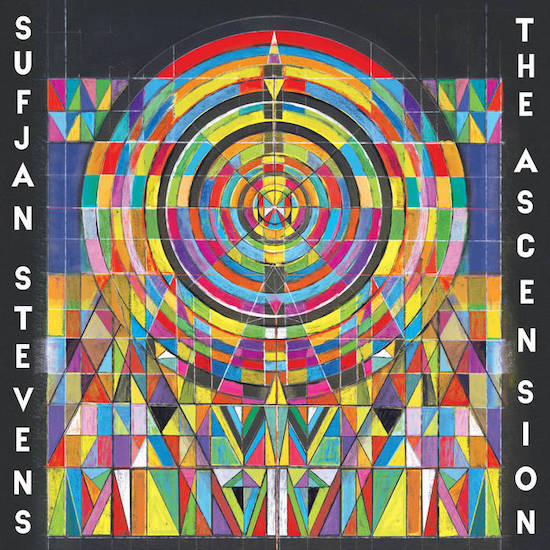A new Sufjan Stevens album comes but once every five years, landing down your chimney like a magic sack from a quinquennial Santa. Clocking in at a massive eighty minutes, The Ascension feels like a software dump on a first listen, and patience is required. Fifteen tracks long, often with a similar pace and tone, it’s all a bit overwhelming to begin with. Asthmatic Kitty Records are following the modern trend in the streaming age of big artists bestowing on us remarkably long records. Despite his indie roots, Stevens is a medium-to-large pop star these days, and one who has accrued enough goodwill that people will pay attention no matter how much he demands of the listener. It’s a privileged place to be in. The Ascension is a dense work of art, stealthy and clandestine, that’s in no hurry to give up all of its secrets and surprises.
If that’s antithetical to the kind of superficial clicking and immediate gratification of the age, then the record itself feels analogous to the strange, difficult times we find ourselves in. The lead single, ‘America’, was actually written around the time of Carrie & Lowell, but Stevens felt it was too ‘mean-spirited’ to be included alongside material that’s mostly elegiac in feel. When he stumbled upon the demo recording again a few years later he was “shocked by its prescience”. The twelve-and-a-half minute ‘America’ is a narrative about falling out of love with your country as it slides slowly and inexorably into decline, ending eerily and uncannily in a cloud of celestial feedback and static. It formed the basis for everything that came after.
Recorded mostly at home on a computer, it’s skilfully done – something that becomes more apparent with each play. This isn’t the first time Stevens has made a record predominantly with synthesizers: The Age of Adz from ten years ago confounded some fans who’d followed his indie folk musings from the very beginning, but it was a fascinating diversion for the rest of us – a quixotic and mercurial exploration of the progressive electronic genre (the concluding track, ‘Impossible Soul’, weighed in twenty-five minutes). The Ascension is another cosmic maelstrom, but it’s less experimental and more uniform than its forebear; the fantasia-like wonder and caprice of The Age of Adz has been eschewed for more regulated, soulful, almost mournful terra firma. It’s cyborgian, from the mechanised RnB of ‘Video Games’ to the robot Madonna of ‘Lamentations’. ‘Ursa Minor’ especially is half ambient, half glitchy automaton. The Ascension is a collection of cybernetic torch songs and sci-fi praise songs.
‘Die Happy’ at the centre of the record is a six-minute long mantra where Stevens sings “I wanna die happy” over and over, forcing the listener to consider what he actually means by that. The more it’s repeated, the more the meaning twists as you think about it. Good art should leave you to draw your own conclusions, which The Ascension does in abundance. ‘Ativan’ sees Sufjan facing uncertainty, despite his faith. He questions if what’s happening now is all part of a divine plan. Within this existential crisis he’s filled with the blood of Jesus one minute, and shitting his pants the next. Whether he means metaphorically or he’s talking about an actual physical stool, it’s not what you expect from Cliff Richard.
Arriving a few months ahead of the US General Election, The Ascension feels like an attempt at rebalancing our perceptions of the Christian movement – if only in a small way – at a time when the fundamentalist right threatens to lead us towards armageddon driven by zeal, insanity and their own certainty. For all the synthetic otherworldliness, this record is unflinchingly honest in its assessment of the United States as well as a very personal and raw portrait of Steven’s own humanity and fallibility. There’s no dogma, only equivocation. To hear free-thinking and self-awareness from an American follower of Christ is a blessed relief and offers reassurances that not everybody has lost their minds.


